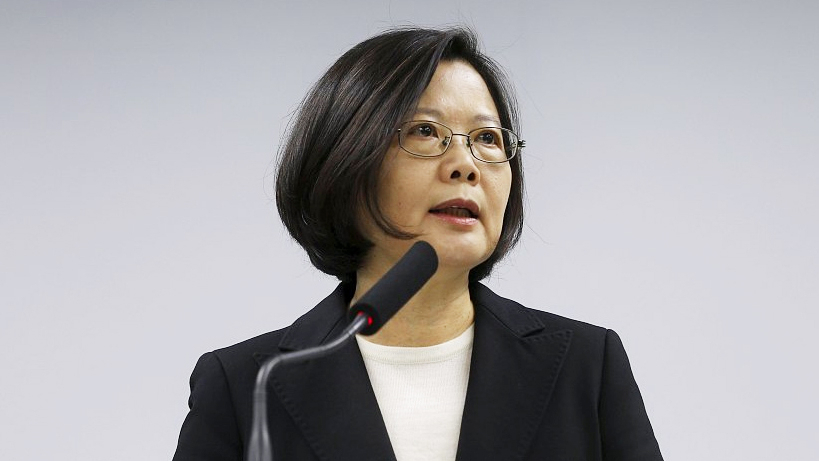
Editor's note: Tom Fowdy is a British political and international relations analyst and a graduate of Durham and Oxford universities. He writes on topics pertaining to China, the DPRK, Britain, and the U.S. The article reflects the author's opinions and not necessarily the views of CGTN.
Next week marks the Taiwan leadership election. Incumbent Democratic Progressive Party (DPP) leader Tsai Ing-wen faces off against mayor of Kaohsiung and Kuomintang (KMT)'s candidate, Han Kuo-yu.
The election is expected to be interpreted as a pivotal point in the island's relationship with the Chinese mainland, with Tsai pushing for greater separation and Han arguing for the benefit of closer ties.
In doing so, the DPP leader has sought to weaponize fear of China to boost her own electoral prospects and make it harder for opponents to argue for reconciliation with the Chinese mainland.
Since the summer of 2019, she has played upon the impacts of Hong Kong protests and persistent negative coverage of the Chinese mainland by the Western mainstream media. This has already given her the upper hand. However, it hasn't been enough.
Now as the campaign heads into its climax, she has further sought to exacerbate anxiety surrounding the Chinese mainland with exaggerated claims of "electoral interference" and the subsequent pushing of an "anti-infiltration bill," which is designed to stifle dissenting views in the long run and enhance DPP's broader agenda.
In doing so, they aim to articulate a simply binary narrative: If they win the election, Taiwan "defeated and rejected" the Chinese mainland; if they lose, then the Chinese mainland "simply rigged it" – as Taiwan's politician Joseph Wu wrote in an article.

Tsai Ing-wen, leader of the DPP.
Tsai Ing-wen, leader of the DPP.
Since 2016, the meme of generating a narrative of "election interference" has gained currency amongst democracies as a means to legitimately consolidate power and discredit dissenting views by intentionally stoking up fear of an "authoritarian other," as well as to secure increasingly hawkish foreign policies.
The election of Donald Trump in the United States produced a sentiment that Russia had manipulated the presidential election, therefore the White House was illegitimate and the country's politics was being infiltrated by Moscow. The claims were grotesquely exaggerated and weaponized into a mass hysteria for a broader agenda.
Their purpose was to prevent Trump from potentially challenging conventional narratives of the U.S. foreign policy, affirming greater pressure on Silicon Valley to shut down dissenting views, and of course the more domestic political application of simply discrediting the president due to his more polarized views on things such as immigration.
Now, the DPP is weaponizing the same discourses in order to benefit its own electoral campaign. Without concrete evidence, the DPP leader is accusing the Chinese mainland of interfering in the Taiwan's leadership election with the broader purpose of stoking fear against the mainland, presenting herself as the only individual who will protect the island's interests.
Already riding on the hysteria mounting from Hong Kong, the DPP have utilized the timing to push the "anti-infiltration bill" – which will limit the scope of debate by increasing the political and legal stakes for people to criticize the status quo, thus stoking greater paranoia of the Chinese mainland.
In this case, it should be understood that the DPP are essentially playing "the mainland card" to win re-election. And with this strategy, even if Tsai lost the election, her defeat would be rendered as an illegitimate result due to what they call "interference" by the Chinese mainland.
The U.S. is also weighing in to help this narrative should this happen, with the National Defense Authorization Act demanding a report on "Taiwan election interference" a month after the election, which will no doubt make spurious claims against the Chinese mainland.
In final analysis, Tsai's campaign is premised around stirring up fear, anxiety and paranoia with the goal of creating further space and differentiation between Taipei and the Chinese mainland, aiming to make it harder and more costly for opposition politicians to argue in favor of reunification or closer ties with the mainland. As a result, next week will be a decisive point in the island's history and pathway.
(If you want to contribute and have specific expertise, please contact us at opinions@cgtn.com.)